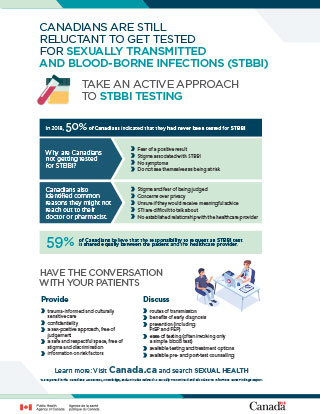Archived - Addressing reluctance to STBBI screening

 Download this article as a PDF
Download this article as a PDFPublished by: The Public Health Agency of Canada
Issue: Volume 45-2/3: Multidrug resistant gonorrhea
Date published: February 7, 2019
ISSN: 1481-8531
Submit a manuscript
About CCDR
Browse
Volume 45-2/3, February 7, 2019: Multidrug resistant gonorrhea
Infographic
Canadians are still reluctant to get tested for sexually transmitted and blood-borne infections (STBBI)

Text description: Infographic
Canadians are still reluctant to get tested for sexually transmitted and blood-borne infections (STBBI)
Take an active approach to STBBI testing
In 2018, 50% of Canadians indicated that they had never been tested for STBBI
Why are Canadians not getting tested for STBBI?
- Fear of a positive result
- Stigma associated with STBBI
- No symptoms
- Do not see themselves as being at risk
Canadians also identified common reasons they might not reach out to their doctor or pharmacist.
- Stigma and fear of being judged
- Concerns over privacy
- Unsure if they would receive meaningful advice
- STI are difficult to talk about
- No established relationship with the healthcare provider
59% of Canadians believe that the responsibility to request an STBBI test is shared equally between the patient and the healthcare provider.
Have the conversation with your patients
Provide
- trauma-informed and culturally sensitive care
- confidentiality
- a sex-positive approach, free of judgement
- a safe and respectful space, free of stigma and discrimination
- information on risk factors
Discuss
- routes of transmission
- benefits of early diagnosis
- prevention (including PrEP and PEP)
- ease of testing (often involving only a simple blood test)
- available testing and treatment options
- available pre- and post-test counselling
Learn more: Visit Canada.ca and search SEXUAL HEALTH
*As reported in the Canadians’ Awareness, Knowledge, and Attitudes Related to Sexually Transmitted and Blood-Borne Infections: 2018 Findings Report
